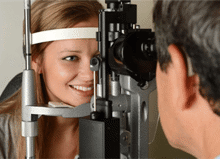Ready readers; they’re everywhere. In the local supermarket or high street store, at some ‘too good to be true’ prices too. But just what are the advantages and disadvantages of buying an off-the-shelf pair of reading glasses, as opposed to a pair prescribed by your local optician?

Advantages of ready readers
- They may save you money in the short term with prices as low as £1 for high street reading glasses.
- Take very little time to get a hold of
- Can offer multiple pairs to put around the house
Disadvantages of ready readers
- A Which? a researcher found that those carrying a higher prescription (+3.50 to +4.00) considered causing the most concern. They said ‘For people with higher prescriptions, they’re not suitable for walking or other mobile activities. They could even cause a nasty accident’.
- Cheap reading glasses could end up costing your eyesight as well as your eye health
- May leave wearers with eye strain, headaches or even blurred or double vision
- Another big problem is that the centre point (optical centres) of the two lenses might not be aligned. This means the sight in one eye might be clear while the other is blurred. This has been the case for some high-street stores.
- High-end retailers even have poorly made reading glasses and uneven centre points within them.
Reading glasses summary
By the age of 50, most adults have problems reading a book or newspaper without spectacles. Naturally, the arrival of cheap, readily available glasses in supermarkets and other high-street stores, has been seen as the quick fix but the long-term effects of this could be very serious to your vision.
All opticians will confirm that full eye examinations are essential before buying glasses. As well as ensuring the correct prescription is used, they can detect serious health issues, such as cataracts and even brain tumours.





